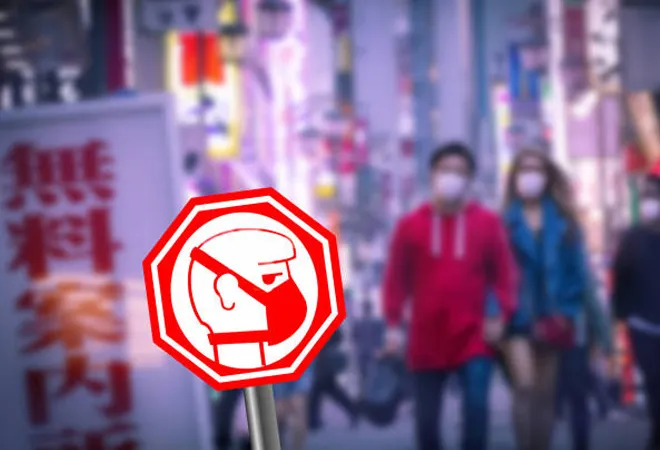
Overseas Chinese have always had a unique relationship with China’s rulers since its imperial past. Since the Communist takeover in 1949, the party-state has sought to co-opt ethnic Chinese settled abroad through the United Front Work Department (UFWD). Now, Xi Jinping is weaponising overseas Chinese on an industrial scale, and its reverberations are being felt in western democracies.
A senior British politician has been accused of accepting funds from an individual with links to the Chinese Communist Party (CCP). Christine Ching Kui Lee’s law firm, Christine Lee & Co, was said to be channeling money to the office of Labour MP Barry Gardiner—who had been bestowed with the Padma Shri award by the Indian government in 2020—and her son was hired in the parliamentarian’s office in Westminster—the heart of the British government—to manage the politician’s appointments. Lee’s firm was the chief legal adviser to the Chinese embassy in London; and at the same time the British government’s Department of International Trade directed foreign businesspeople keen to invest in UK to seek Lee’s legal-advisory services.
Lee has been active in UK’s public life for some time, cultivating the Westminster elite. She received an award from former PM Theresa May for her contribution to Sino-UK relations. Some of Lee’s activities deal with issues that are important for the party-state. This can be evidenced from the fact that Lee had been instrumental in organising UK nationals of Chinese descent and getting them to be more active in politics.
Lee’s firm was the chief legal adviser to the Chinese embassy in London; and at the same time the British government’s Department of International Trade directed foreign businesspeople keen to invest in UK to seek Lee’s legal-advisory services.
Britain’s counterintelligence service, MI5, warned the political establishment that Lee was acting at the behest of the CCP’s United Front Work Department to interfere in British politics. The aim of reaching out to public figures across the spectrum was to ensure that the UK political landscape is “favourable to the CCP’s agenda”, the service warned.
This incident has once again brought the CCP’s influence operations to the fore. In this regard a recent report by Paul Charon and Jean-Baptiste Jeangène Vilmer from the Institute of Strategic Research, which is under the aegis of the French Ministry of Armed Forces, throws light on how the CCP is leveraging overseas Chinese. Throughout its history, Chinese rulers have had a unique relationship with its people living abroad, who have been an important vector for change in the early 20th century. Sun Yat-sen was part of an international network of revolutionaries that played a role in overthrowing the Imperial Qing dynasty and establishment of modern China in 1912.
After the Communist revolution in 1949, aware of the clout of its diaspora, Mao Zedong instituted the United Front Work Department to create an amenable environment for its political agenda. He termed the unit as the CCP’s ‘magic weapon’. Faced with international isolation in the aftermath of the 1989 students’ demonstrators, Deng Xiaoping exhorted overseas Chinese to help China tide over the crisis.
Sun Yat-sen was part of an international network of revolutionaries that played a role in overthrowing the Imperial Qing dynasty and establishment of modern China in 1912.
Till recently the Chinese conceptualisation of its diaspora encompassed three sections namely huaqiao (Chinese nationals, including those off the mainland living abroad), huaren (those who had secured a foreign passport), and huayi (offspring of Chinese born abroad). However, these distinctions have become blurred with CCP General Secretary Xi Jinping expounding his pet project of national rejuvenation, which means restoring China to its ancient glory. In a bid to further the nation’s rejuvenation, he has pushed the notion of ‘China being one family’ irrespective of their nationality. This approach has resulted in institutional changes like the merging of the Overseas Chinese Affairs Office with the United Front Work Department, which is tasked with coordinating different types of influence operations.
The CCP has used another modus operandi to gain access and manipulate political systems in democracies. Chinese diaspora is being encouraged to increase their participation in public life. In Australia, Bo Zhao, a Liberal Party member, claimed he was offered cash by Chinese agents to contest the election to the federal parliament. Zhao was found dead in a Melbourne hotel room in March 2019. Academic Anne-Marie Brady has accused Chinese politicians in New Zealand of clandestine links to the CCP, organisations allied to the party-state raising funds for them and getting other ethnic Chinese to vote for them as a block. She has also alleged that the ethnic Chinese parliamentarians use their influence to push projects like the Belt and Road Initiative (BRI) in New Zealand. Following the revelations, two former MPs have retired from public life.
Since 2015, Chinese youth pursuing studies abroad have become a focus of the United Front Work Department (UFWD). Xi told a UFWD conference in 2015 that Chinese students stationed in foreign nations could serve the Party in different other ways.
Chinese students at the University of California San Diego have campaigned to revoke the institution’s invitation to Tibetan spiritual leader the Dalai Lama.
In his book The End of History, Francis Fukuyama posited that students returning to China would be a catalyst for political change, and eventually herald a transition from authoritarianism to democracy. Belying such expectations, Chinese students, especially those on foreign campuses, have become instruments to further the CCP’s agenda. One reason for this is that since the 1990s, China has tried to socialise the youth through the patriotic education campaign—which seeks to shore up the Gen Next’s ideological quotient—in such a way that they are supportive of the regime’s agenda. This can be evidenced from the activities of campus bodies like the Chinese Students and Scholars Association that have threatened commercial establishments in Australia for disseminating literature on the Falun Gong (a banned organisation in China), reported to the local embassy on fellow students in connection with their views on human rights. Chinese students at the University of California San Diego have campaigned to revoke the institution’s invitation to Tibetan spiritual leader the Dalai Lama.
In recent years, the CCP has become aggressive in promoting its idea of what constitutes China and its borders. Internally, the party-state has tightened its grip on restive regions like Tibet, Xinjiang, and Hong Kong. Chinese students have taken it upon themselves to guard against cartographic assaults on their nation’s territorial integrity. Thus, a sculpture by renowned artist Mark Wallinger at the London School of Economics and Political Science depicting Taiwan as a sovereign nation was object of Chinese students’ ire. It was not lost on the students that the institution was also the alma mater of Taiwan’s independence-leaning President Tsai Ing-wen. Some of the students, who made a representation to the authorities on campus, told the author that they had a sacred duty to protect the nation’s interest. Similarly, a sustained campaign by Chinese pupils forced a lecturer at University of Sydney to apologise for using a map that “inaccurately” depicted the India-China border.
Since Xi came to power, he has also launched a drive to weed out corrupt officials and CCP cadres. In order to get hold of those who fled abroad, a campaign called ‘Fox Hunt’ has been launched with overseas Chinese playing an instrumental role in this. An instance of this come to light in the US in which Chinese nationals living there were trying to coerce a former Chinese city government official to return back. Eight individuals, some of whom had been resident in the US, were charged by the Department of Justice for acting as illegal agents of the People’s Republic in October 2020. However, official Chinese narrative depicts Fox Hunt as an effort in which the law-enforcement machinery actively liaisons with local authorities to bring fugitives who have harmed the nation to book. This can be evidenced from a TV series coincidentally titled ‘Fox Hunting’ produced by China’s Ministry of Public Security.
A sustained campaign by Chinese pupils forced a lecturer at University of Sydney to apologise for using a map that “inaccurately” depicted the India-China border.
While Xi talks about the need to project a good picture of the nation, China’s use of its overseas nationals seems to be causing more harm than good. Startled by the case of Christine Lee, the UK government plans to table anti-foreign interference legislation, on which public consultation had commenced in 2021, in parliament this year. It endeavours to create a register of ‘declared activities that are undertaken for, or on behalf of, a foreign state’. Australia cleared its foreign interference law in 2018, much to the chagrin of China. In 2021, the ambit of the same has expanded to campuses. New rules on foreign interference stipulate training of students to recognise and report meddling by foreign powers. Raising the stakes in its confrontation with China, the chair of Australia's intelligence committee, categorically singled out the Chinese threat as the raison d’etre for the nation’s anti-interference laws in a speech to the European Parliament. Now, the European Commission has said it is also developing foreign interference rules for European universities.
Thus, the overuse of its nationals and students to execute the CCP’s agenda is harming the nation’s soft power, and may harm the interests of ethnic Chinese settled abroad in the long run.
Samir Saran & Akhil Deo, Pax Sinica: Implications for the Indian Dawn (Rupa Publication, 2019), pp. chap. 7.
Clive Hamilton, Silent Invasion: China's influence in Australia (Hardie Grant, 2018), pp. chap. 10.
The views expressed above belong to the author(s). ORF research and analyses now available on Telegram! Click here to access our curated content — blogs, longforms and interviews.




 PREV
PREV


